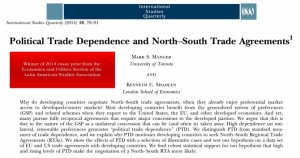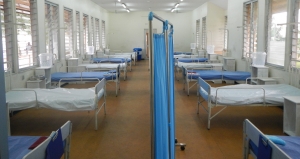Professor Ken Shadlen tells us about his editorial role in the latest special issue of Studies in Comparative International Development.

I co-edited the special issue (Intellectual Property, Access to Medicines, and Health) with Nitsan Chorev, a sociologist at Brown University. Our concern was to update the scholarship on the interface between intellectual property (e.g. patents, trademarks), the supply of and access to medicines, and health in developing countries.
The motivation behind the special issue was that the literature on these topics had more or less stalled. After an explosion of scholarship that explained the origins of new rules on intellectual property, including the World Trade Organization’s Agreement on Trade-Related Aspects of Intellectual Property Rights (TRIPS) as well as bilateral and regional trade agreements that include IP provisions, there has been much less analysis of what is actually happening on the ground.
That struck us as odd and unfortunate. After all, the upshot of much of the work on TRIPS, for example, was that, as important as it is, the effects are going to be felt according to how countries go about changing their national laws and practices to conform with the international agreement. So we need to look at what is happening within regions and within countries.
The articles in this special issue do that, focusing on the processes of alliance formation that affect countries’ responses to the new international rules, and evaluating the effects of such measures.

Highlights from the Special Edition
The special issue emerged from a conference hosted by the Watson Institute at Brown University. The authors address a range of topics.
Nitsan Chorev analyzes the politics of counterfeit medicines in East Africa. Her analysis shows how both global and national conflicts have narrowed over time.
Tatiana Andia (MSc Development Studies, 2004-05!) examines the interaction between transnational and national social movements in the conflicts over an essential drug for treating HIV/AIDS in Colombia and Ecuador, while Angelina Godoy examines how conflicting visions and priorities regarding patents, drugs, and health care delivery affected political mobilization over IP in Central America. Both Andia and Godoy’s articles point to the complex and uneasy processes of coalition formation.
Giuliano Russo and Geoffrey Banda examine the local production of pharmaceuticals in sub-Saharan Africa. New international rules on IP and changes to the structure of the global pharmaceutical industry present challenges, but also perhaps opportunities for the development of local pharmaceutical production. Russo and Banda’s case studies of Mozambique and Zimbabwe consider what these challenges look like in two countries with distinct trajectories of industrial development and political economic conditions.
Bhaven Sampat and Kenneth Shadlen analyze TRIPS implementation in Brazil and India, focusing on these two countries’ approaches to addressing “secondary pharmaceutical patents” (patents on alternative forms of existing drugs). Brazil and India’s policies toward secondary patents have gained a great deal of attention, both from critics who fear such measures undermine TRIPS, and from supporters who regard them as essential for buffering the impact of TRIPS, but little is known about how these measures function in practice. This paper (part of the authors’ ESRC project on the topic), is the first comparative empirical analysis of measures toward secondary patents in developing countries.
See the full Special Issue here.
Related posts:
   |





